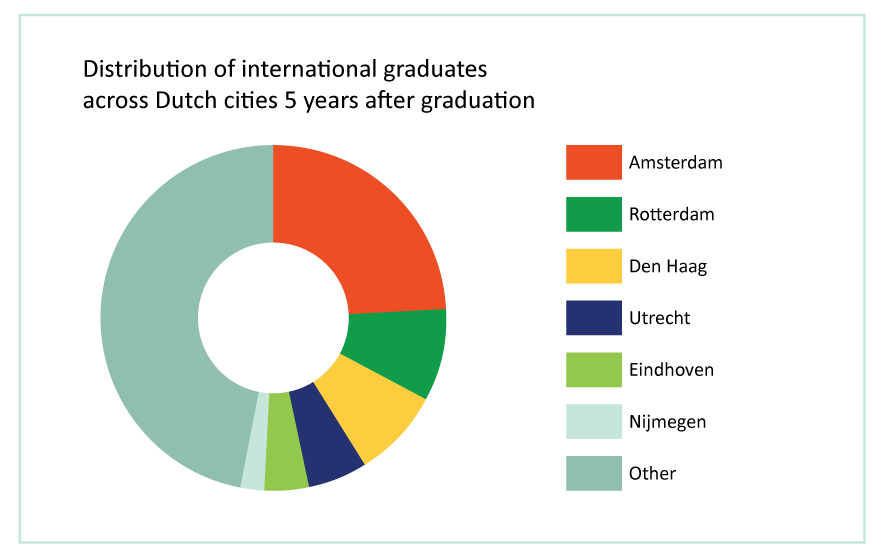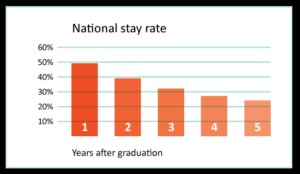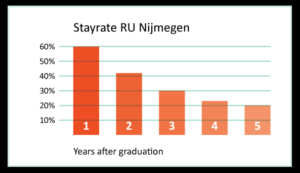They leave the nest after they graduate
-
 Images: Roel Venderbosch
Images: Roel Venderbosch
Where do international students go after graduation? Most of them leave Nijmegen, as apparent from new figures. Vox wonders why.
Nijmegen is not a popular place for international graduates to settle. This is the overwhelming conclusion from statistics on where international students settle after graduation. Many internationals do stay in the Netherlands after graduating from Radboud University. But five years after graduation, the large majority of them no longer live in Nijmegen, but in the Randstad or in technology hubs like Eindhoven.
For the past few years, Nuffic, the Dutch organisation for internationalisation in education, has mapped how many international students remain in the Netherlands after graduation. This is becoming more relevant as the number of international students continues to grow. It would be a pity to see all these talented people leave the country as soon as they graduate. The Dutch government couldn’t agree more, and last year’s coalition agreement included the intention to make efforts to retain international talent in the Netherlands. Nuffic published new figures today on internationals who graduated in the Netherlands between 2006 and 2013. Nuffic follows students for five years after graduation, which is why more recent cohorts are not included.
Eindhoven
What the figures clearly show is that the international graduates who stay don’t choose Nijmegen. There are currently 21,000 internationals still living in the Netherlands five years after graduation. Of these 21,000, only 475 are located in Nijmegen. This is in sharp contrast with other cities, most of all Amsterdam (5130). But also cities like Utrecht (1195) and Eindhoven (880) score much better with international graduates. It should be noted in this context that Radboud University has relatively few international students to begin with. In 2013, Radboud University counted 525 international graduates, while in the same year the University of Amsterdam produced twice as many (1083).
On the other hand, the number of international graduates in Eindhoven is even lower. In 2013, TU Eindhoven produced only 239 international graduates. And yet, Eindhoven is now home to 400 more international graduates from the 2006-2013 cohorts. Or consider Utrecht University, which awarded 539 diplomas to international students in 2013, only 14 more than Nijmegen. Yet Utrecht boasts more than 700 international graduates.
Five years after graduation the vast majority no longer lives in Nijmegen
Are Nijmegen students simply a lot more likely to return to their home country? Apparently not. A year after graduation, 60% of them still live in the Netherlands. Five years after graduation, this still applies to 20% of them, which is quite a high percentage. There are no figures on where Nijmegen international graduates settle precisely. It looks as if many of those who remain in the Netherlands relocate to other Dutch cities.
Randstad
Where internationals settle seems to depend on the work climate. For Joris Knoben, Professor of Business Economics in Nijmegen and expert on the relationship between companies and their environment, these figures confirm what he sees among his own students. ‘Most people migrate to the Randstad. That’s where the interesting employers are: large internationally oriented companies. Recent graduates are unattached and easily relocate to follow opportunities elsewhere. Incidentally, this is not only true of internationals; our Dutch graduates also often relocate to the Randstad.’
Nijmegen doesn’t have much to offer when it comes to large multinationals, explains Knoben. Internationally operating companies rely on proximity to Schiphol. In addition, important services such as legal and financial consultancy agencies are also primarily concentrated in the Randstad. Knoben: ‘In the past few years, we see that large companies are spreading, for example along the A2, in Den Bosch and Eindhoven, where companies like ASML and Philips are located, and East, towards Utrecht. But this trend stops at Wageningen.’
When it comes to employment, Nijmegen mainly depends on the public sector. ‘For example hospitals’, says Knoben. ‘But these are places where knowledge of Dutch is a requirement.’ An exception to this rule is the University, where a PhD student can work in an internationally-oriented environment. But here too, the higher you climb the ladder, the more important language becomes. For a manager or dean, Dutch proficiency is a must.
Stay longer
The figures show a big difference between the various sectors. While 41% of international graduates in technology and science remain in the Netherlands and 34% of mathematics and computer science international graduates, for the humanities and social sciences the figure does not exceed 20%. Maybe the technology sector is less dependent on ‘language’, says Knoben, which is why international students get hired more easily. ‘Another explanation has to do with the number of PhD positions. Technical study programmes offer a lot more PhD positions. It may be that internationals in these fields are more likely to be offered a PhD position and stay longer as a result.’
‘It would be more effective to make sure internationals have a good command of Dutch’
Knoben points to figures from Statistics Netherlands (CBS) on the number of internationals who start their own company. Nijmegen heads the list: 10% of our international graduates end up starting their own business. You can interpret this positively: Nijmegen study programmes teach students how to be independent. But a more negative interpretation is also possible. Maybe the labour market in Nijmegen and surroundings has so little to offer internationals that they have no choice but to go independent.
How can we make Nijmegen more appealing to international graduates? The Municipality can stimulate local companies to adjust to non-Dutch speakers, thus increasing the range of jobs for internationals. But according to Knoben, it would be more effective to make sure internationals have a good command of Dutch. ‘Otherwise they always remain on the company’s periphery. The most crucial skill is social Dutch. You want to be able to chat with people at lunchtime; otherwise you quickly end up feeling isolated among your colleagues.’
Mostly Germans
CBS figures on the origins of Nijmegen citizens born outside the Netherlands reveal where Nijmegen internationals come from. Once you eliminate countries with a history of labour migration and refugees, Germany heads the list by a wide margin: 2504 Nijmegen residents have German roots. Half of the German Nijmegen citizens are aged 15-30, which points to many German Radboud University and HAN University of Applied Sciences students.
Germany is followed by China (673), the UK (560), Poland (460) and Italy (451). In total, Nijmegen is home to 24,000 residents born outside the Netherlands, which accounts for nearly 14% of the city’s total population. One in seven Nijmegen residents has foreign roots, although this figure of course includes many refugees and immigrant workers.



